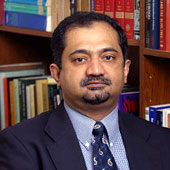What Can Be Done About Pakistan?
In the wake of the Mumbai terrorist attacks, what should be done to bring stability and security to Pakistan?
December 22, 2008
Pakistan is not yet a failed state, but it is close to becoming one. Its economy is weak and has long been dependent on U.S. aid for stability.
At the end of this month, it will be removed from the Emerging Markets Index, as investor confidence is very low and the Pakistani government has not yet generated a domestic economic bailout plan in response to the global financial crisis.
Its stock market is expected to erode by 30-40%. It has just received a bailout package of 3.1 billion USD from IMF and will need more (up to $7.6 billion), as its foreign exchange reserves have depleted by 75%.
It suffers from inflation at 12%, one fourth of its population is below poverty line and nearly four million people are unemployed.
The government is unable to exercise sovereignty within its own borders. Armed groups from within it run rampant, kill, murder and assassinate at will — and launch international terror campaigns unchecked.
Foreign nations carry out military operations within its borders and the state of Pakistan is often reduced to spectator status as the war between the jihadis and the West is fought within its borders. The war has now reached urban areas, and cities like Peshawar and even Islamabad are not secure any more.
Pakistan as a state is a divided entity. The civil society is divided between those who are horrified by extremism and those who continue to sympathize with the extremists.
There seems to be an unending supply of recruits and funding available to the jihadis. The so-called silent majority is repeatedly victimized by terrorist attacks, economic uncertainties and by bombing raids by the U.S. military. However, it remains passive and watches helplessly in a daze as the nation slowly crumbles.
The Pakistani state, too, is divided. The biggest cleavage is between the security agencies and the elected politicians. The military does not trust the politicians and the politicians exercise minimal control on the military.
Both pillars of the Pakistani state have lost their legitimacy and the population at large does not trust or respect either of them. The army is scorned for waging a war against its own people and the politicians are despised for kowtowing to India and the U.S.
The Pakistani military, which for years has been its most stable and effective institution, too is divided.
There are those in the military who see common ground with the U.S. against the extremists. They recognize that the jihadis have not only compromised Pakistani security, but are also undermining its very future as a nation state.
Then there are those who resent that the Pakistani military has become an instrument of George Bush’s war on Islam.
They have strong sympathy for the terrorist groups — many of them, after all, were created by the Pakistani army with U.S. help to fight the Soviets, and have been useful assets until now.
Economic weakness combined with the multiple fault lines make Pakistan a very fragile state at the moment.
External pressure applied injudiciously may break it. A disintegrating Pakistan will be exponentially more dangerous than the semi-stable Pakistan we now have.
What all of this means is that the fragility of the Pakistani state and society essentially minimizes the options that are available to India and the U.S. as they jointly seek to combat terrorism emanating from within Pakistan.
Presently, the U.S. and India are squeezing the weakest element of Pakistan — its elected leaders. Because it is weak, the Zardari government is complying, but the scope of its effectiveness is limited.
Zardari's government does not have the credibility or the mandate to go after the army and reform and restructure it. The army can and should be pushed, but only to a limited extent. India and the U.S. must also work independently with the army to reform and purge it.
India must give credible guarantees that an invasion of Pakistan is not imminent — which will give General Kiyani, the Pakistani military chief, the confidence to work with India.
A two pronged strategy — working with the elected government to fight extremism in civil society and with the army to purge it of extremist sympathizers and go after entrenched jihadi encampments — is the best option.
Both India and Pakistan have suffered at the hands of the extremists. Nearly 3,000 Indians and over 2,000 Pakistanis have died in terrorist attacks in the last three years. They must join hands to fight this plague not allow it to become an occasion to fight each other.
Dr. Muqtedar Khan is Director of Islamic Studies at the University of Delaware and Fellow of the Institute for Social Policy and Understanding. www.ijtihad.org.
Takeaways
Presently, the U.S. and India are squeezing the weakest element of Pakistan — its elected leaders.
The army is scorned for waging a war against its own people and the politicians are despised for kowtowing to India and the U.S.
Pakistan as a state is a divided entity. The civil society is divided between those who are horrified by extremism and those who continue to sympathize with the extremists.
A disintegrating Pakistan will be exponentially more dangerous than the semi-stable Pakistan we now have.
The fragility of the Pakistani state and society essentially minimizes the options that are available to India and the U.S. as they jointly seek to combat terrorism emanating from within Pakistan.
Read previous
No Time to Waste
December 19, 2008
